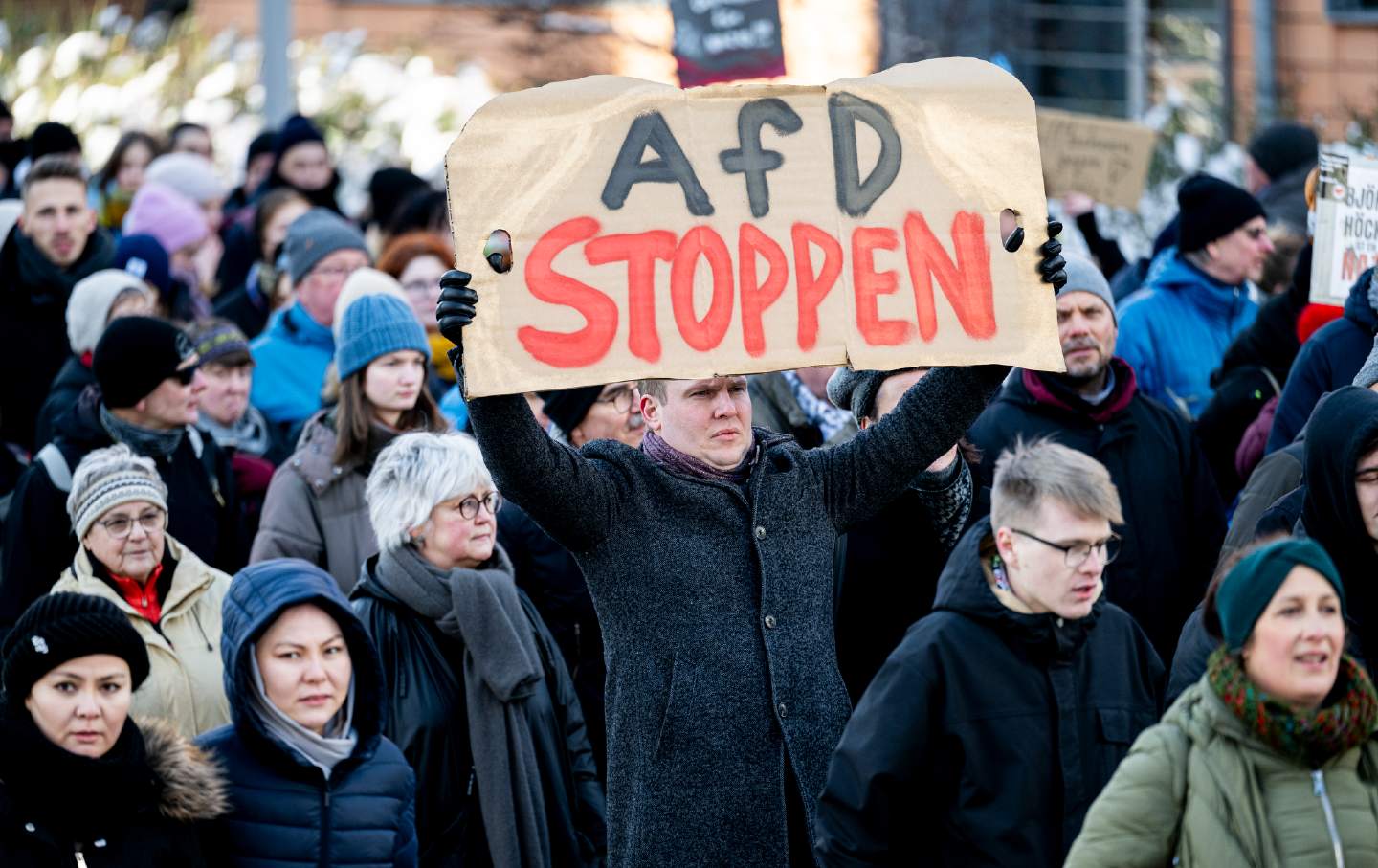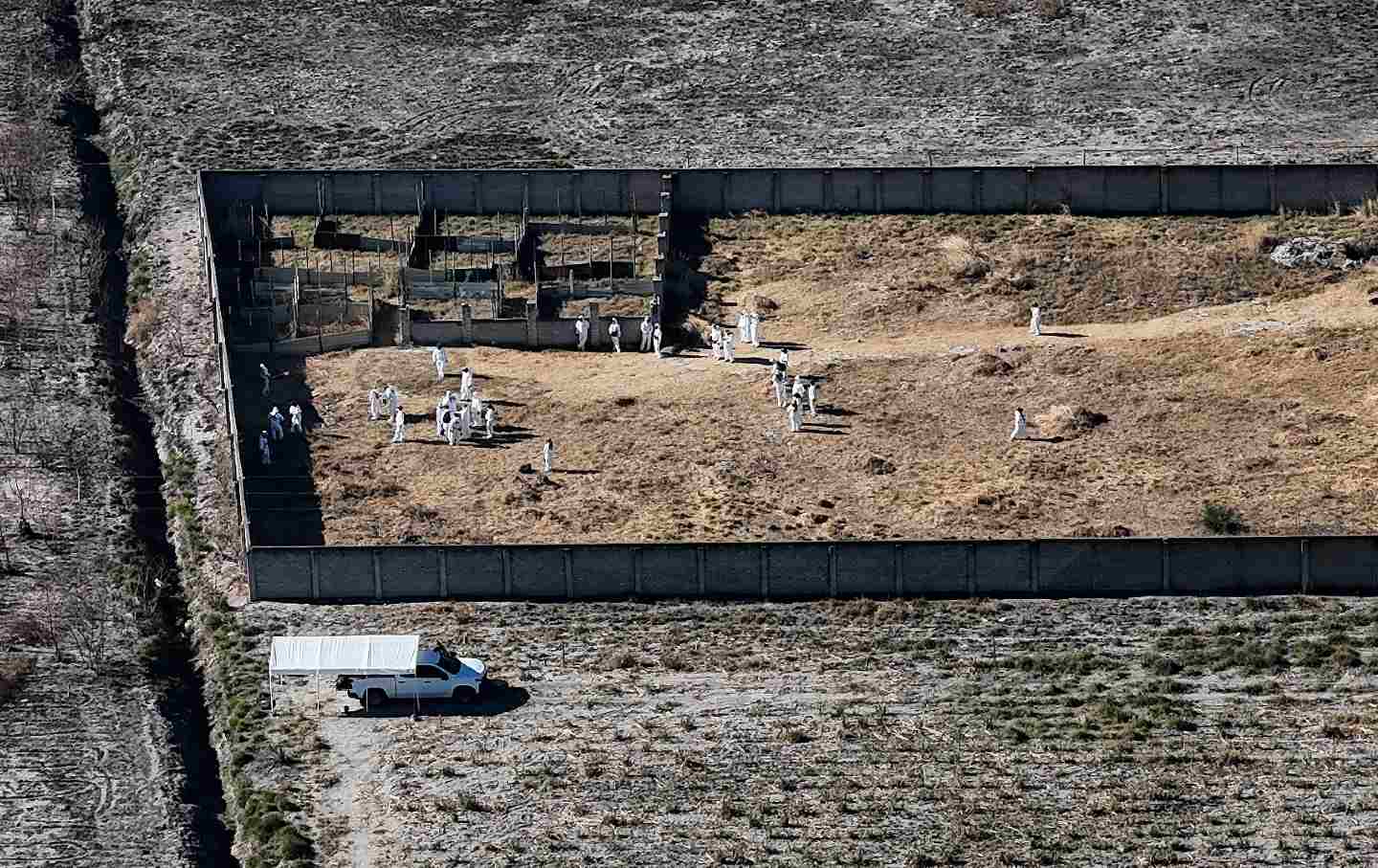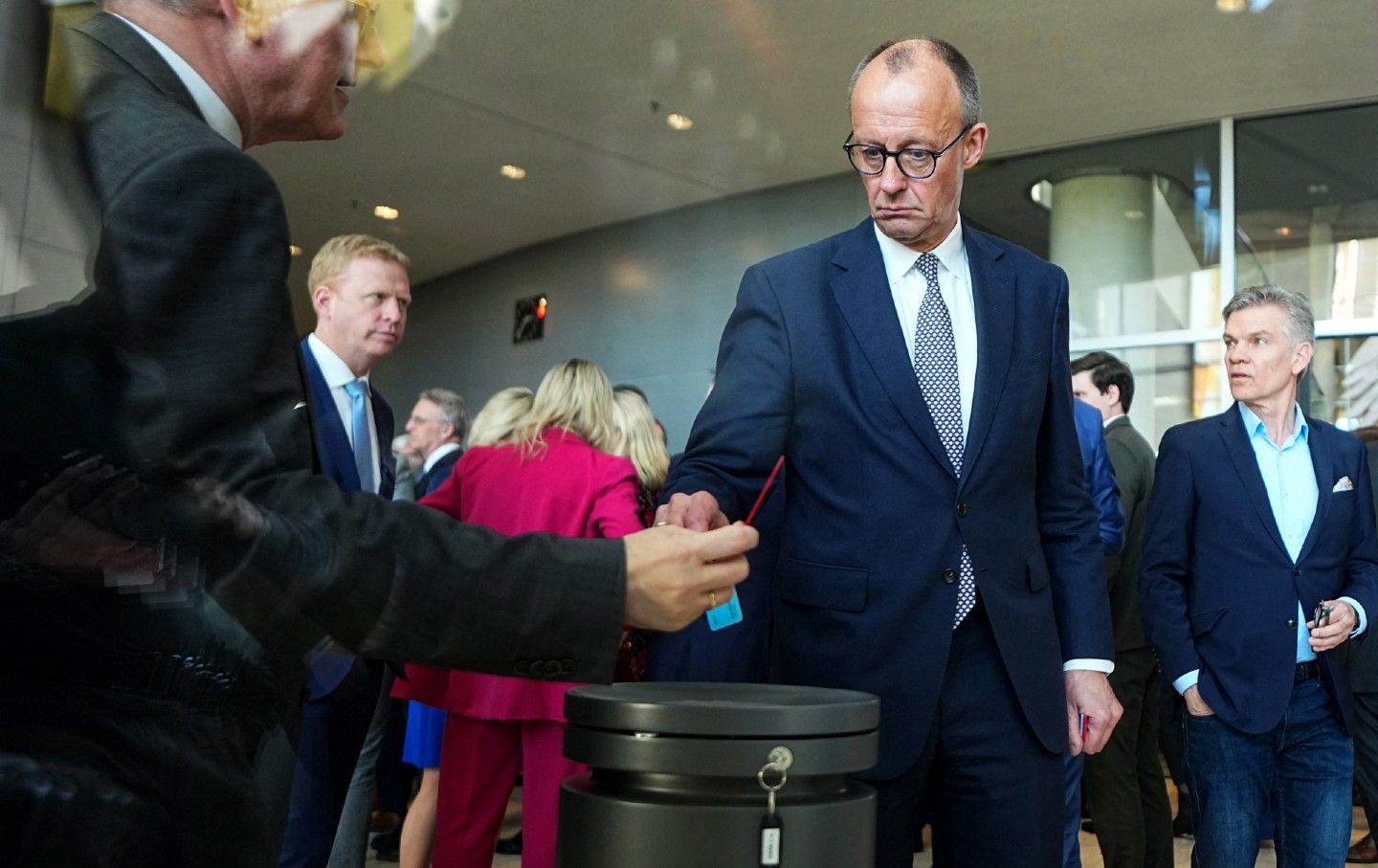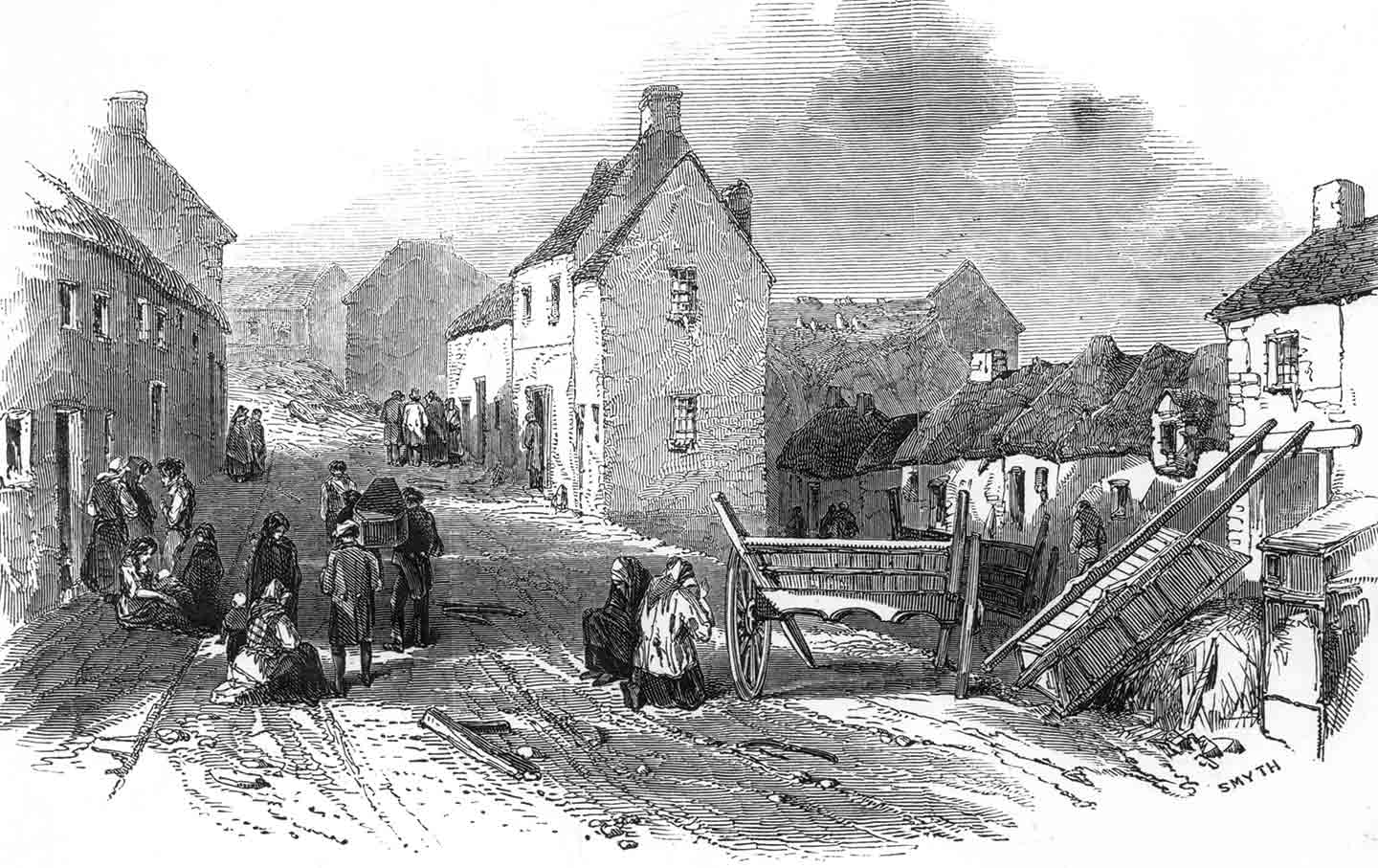Five Strategies to Beat Back Germany’s Far Right
The Alternative for Germany party is soaring in popularity, especially in the east. Now many Germans are fiercely debating how best to defeat the radical right.

A participant holds a banner—which translated into English, reads, “Stop AfD”—in Erfurt, Germany on January 20, 2024.
(Jacob Schröter / picture alliance via Getty Images)It took long enough, but ordinary Germans and its democratically minded political class woke up to the fact that an extreme right-wing party, the Alternative for Germany (AfD), is soaring in popularity and will likely transform Germany in the course of this year’s local, regional, and EU elections. The AfD endorses a racist ideology even more authoritarian than many of its far-right peers across Europe, and is currently polling as the second strongest party in Germany, at 22 percent, behind only the Christian Democrats. In eastern Germany, where it sits atop polls in most states with over 30 percent support, the domestic intelligence agency considers three of AfD’s state branches as“extreme right” and has them under ramped-up surveillance. Experts say that given other mainstream parties’ weakness in eastern Germany, it is possible that the most radical branches, for example in Thuringia in central Germany, could win elections and even govern this year.
The AfD’s ascendance and radicalization has been in process since its founding a decade ago. The party has already captured majorities in several small towns and pushed the national consensus on immigration and the climate crisis to the right.
But it was a January 15 report published on a secretive gathering of right-wing extremists in November that ignited demonstrations of over a million people across Germany. At a lake-side hotel in Potsdam, a city near Berlin, leading figures in the AfD put their heads together with known neo-Nazis, deep-pocketed financiers, and a hodgepodge of other national conservatives to devise a “masterplan for re-migration,” which lays out the logistics to deport, forcibly if necessary, millions of foreigners and foreign nationals with German citizenship. It is, say experts like Hajo Funke, an author of books on political extremism, a “strategy for destroying the republic.”
The revelations and heightened awareness of AfD’s surge in popularity—as well as levels of street violence not seen since the early 1990s—sent Germans not normally involved in public protests spilling into town squares. “Germans comprehend that democracy is threatened and that they have to stand up for it,” Lorenz Blumenthaler of the Amadeu Antonio Stiftung, a democracy promotion NGO, told me. Families and trade unionists joined antifa and hardline leftists in expressing a unified message: The AfD is not the “silent majority” that it claims to be, but rather we are—and we are no longer silently watching on. Homemade signs hoisted on broom sticks read: “Silence means acceptance,” “Everyone together against the right,” “Stop the AFD,” and “No place for Nazis.”
But there is no consensus in Germany about how to beat back the AfD—only, says Funke, that it is the starkest crisis since the republic’s founding in 1949. Exactly how Germany will take the battle to the extremists is being in the media, in the Bundestag, and around dinner tables. Here are the pros and cons of the five most-discussed strategies to keep the far right at bay.
Strategy 1: Outlaw it.
Germany’s constitution gives the country’s highest court the power to ban political parties that undermine the democratic order. And there are figures in every political party outside of the AfD who are calling for the AfD’s official prohibition—just as others in the same parties warn against it. Proponents argue that since Germany considers itself a wehrhafte Demokratie, or a defensive democracy, the country can and must squelch any serious threat to democracy—and most experts conclude that the AfD constitutes such a threat. The conservative governor of the state of Schleswig-Holstein Daniel Günther argues that the state “should use the instruments at its disposal for the purpose of its own protection.” The Greens of Brandenburg, an eastern German state surrounding Berlin, endorse the same: throw everything at it, including a trial before the country’s highest court.
Pros: The AfD’s racist rhetoric and ties with the neo-Nazi scene fly in the face of German law, and if it’s illegal, then proscribe it. Even though a trial would take two to four years, setting it in motion effectively puts the AfD on the stand before the nation. Some argue that it makes more sense to censure particularly toxic party branches, the AfD’s over-the-top youth organization, or individual politicos, rather than the entire party, which also has more moderate branches and members.
Cons: A trial could make a martyr out of AfD. Moreover, banning a party doesn’t eliminate its supporters or the sentiments that propel it. Democratic parties and publics must dispel conspiracy-theory falsehoods and lies with the better arguments. Otherwise, the far right’s ideas will surface again, in other forms. And it is surely unreasonable to disenfranchise so many voters; invalidating a party that in Saxony in early January appealed to 37 percent of those polled (while the Social Democrats, SPD, landed at 3 percent and the liberal Free Democrats at 1 percent) could spark a massive backlash.
Strategy 2: Slash its finances.
Short of a ban—and with a lower legal bar—unconstitutional parties can be sanctioned by halting the finances that the state makes available to parties that place in state, federal, and EU elections. In 2023, the AfD received nearly 12 million euros from the state, or just under half of its total income. Last year, Germany’s highest court ruled that the AfD should not receive the money that other parties do to run a public foundation, such as the Greens’ Heinrich Böll Stiftung. And just this year it ruled that the neo-Nazi National Democratic Party (NPD), which now calls itself Die Heimat (The Homeland), could be stripped of state funds because of its undemocratic politics, which creates precedent to do the same to the AfD. After all, a report by the weekly Der Spiegel found that the ideology of the two parties overlapped substantially. The extreme wings of the AfD state that they want to overturn liberal democracy—the way Viktor Orban has done in Hungary.
Pros: Depriving the AfD of nearly half of its funding would be a huge blow. It would also send the message that parties like the AfD and NPD are categorically different than the country’s democratic parties.
Cons: According to German law, state funding of parties is based on their vote tallies—and thus the AfD is due its share. Should democrats bend the rules to beat such a tawdry grab-bag of reactionaries? And this call, the purview of the high court, would take as long as securing a ban.
Popular
“swipe left below to view more authors”Swipe →Strategy 3: Let it rule.
There has long been an arch conservative fringe in the Christian Democrats (CDU) in favor of forming “black blue” coalitions with the AfD. And the CDU is not the only party that has teamed up with the far rightists to get legislation passed. Among others, the prominent columnist Alan Posener argues that the best way to delegitimize the AFD is to accept election results and let them take office. Their unprofessionalism and retrograde agenda would expose and sink them. Let’s not panic, says Posener, this isn’t 1933, referring to the year that the Nazis took power.
Pros: Like it or not, the AfD will enter office this year in countless localities. And although far-right parties have shared in power in nearly every country in Europe, they’ve been forced them to moderate and conform. And, with the exception of Hungary, their participation in governance hasn’t gutted these democracies.
Cons: The normalization of hard right parties and illiberal ideologies accepts and cements their place in these countries. Their influence on societies where they share in power should not be underestimated: It has shifted discourse and influenced policy, particularly on the issue of immigration. The Nordic countries’ ever more restrictive immigration laws are case in point. “Every move in the direction of the AfD,” argues political scientist Benjamin Höhne from the University of Münster, ”whether it’s some kind of communication or cooperation in a parliament, ultimately it benefits the AfD.”
Strategy 4: Mobilize civil society.
The explosion of protest is hugely positive, if overdue. “Cynicism and fascism thrive on crisis fatigue, silence, and isolation,” climate activist Luisa Neubauer, whose NGO Fridays for Future kicked off the demonstrations, said. “The public outpouring shows that the ideas and sentiments that the far right has introduced into our political culture—and were picked up by the mainstream media and political parties—are not normal, not acceptable to the overwhelming majority of Germans,” Eberhard Seidel of the NGO Schools without Racism told me. Dieter Rucht, a scholar of social movements, told me that civil society will hopefully pick up the impetus at the grassroots level and fuel a wide-ranging discussion. He said that we shouldn’t shirk from engaging with those people leaning toward the right—we must try to convince them that the hard right’s promises are populist fabrications. As for those with entrenched fascistic convictions: Forget it, even the best arguments won’t faze them, so don’t waste the time.
Pros: A sustained mass movementsends a clear message not only to fellow citizens but alsothe centrist political parties, whose wavering of late was becoming ever more conspicuous. “There’s a new consciousness now,” Blumenthaler said. “All of the demonstrators, many taking part in a public protest for the first time, understand themselves as civil society, as a force standing up for and actively defending democracy.”
Cons: The climate movement is stark evidence that millions of people on the streets doesn’t overturn interest-based policies.
Strategy 5: All for one, and one for all
The spectrum of democratic parties—from the Left Party to the Christian Democrats—must stick together as guardians of the liberal order. It is possible that in the eastern states only all-for-one coalitions can hold off the AfD. This might mean Christian Democrats and the Left Party joining forces and even putting forward a joint candidate, which both have sworn they will never do.
Pros: Studies show that when mainstream parties try to steal the thunder of far-right demagogues, they wind up losing out to them: their voters don’t want a milder version of the program. By legitimizing the right-wing agenda, the centrist parties open a floodgate that ultimately spells their own demise. Just ask bankrupt conservatives in Hungary, the Netherlands, France, Denmark, and Italy. They lost by stepping onto the far right’s turf.
Cons: There are critics, like the denizens of the new left-populist party of Sarah Wagenknecht (BSW), who charge that the broad mainstream consensus is exactly what enrages and alienates so many German voters. This upstart party, which is polling double digits in eastern Germany, meets the AfD halfway on many issues, such as migration, the war in Ukraine (both are pro-Russia), and climate protection, where they argue that the government is asking too much of ordinary citizens. Dagdelen Sevim, a Bundestag MP who switched from the Left Party to BSW, told me there are a lot of people who vote for the AfD not because of its ideology but out of disappointment in the coalition.








